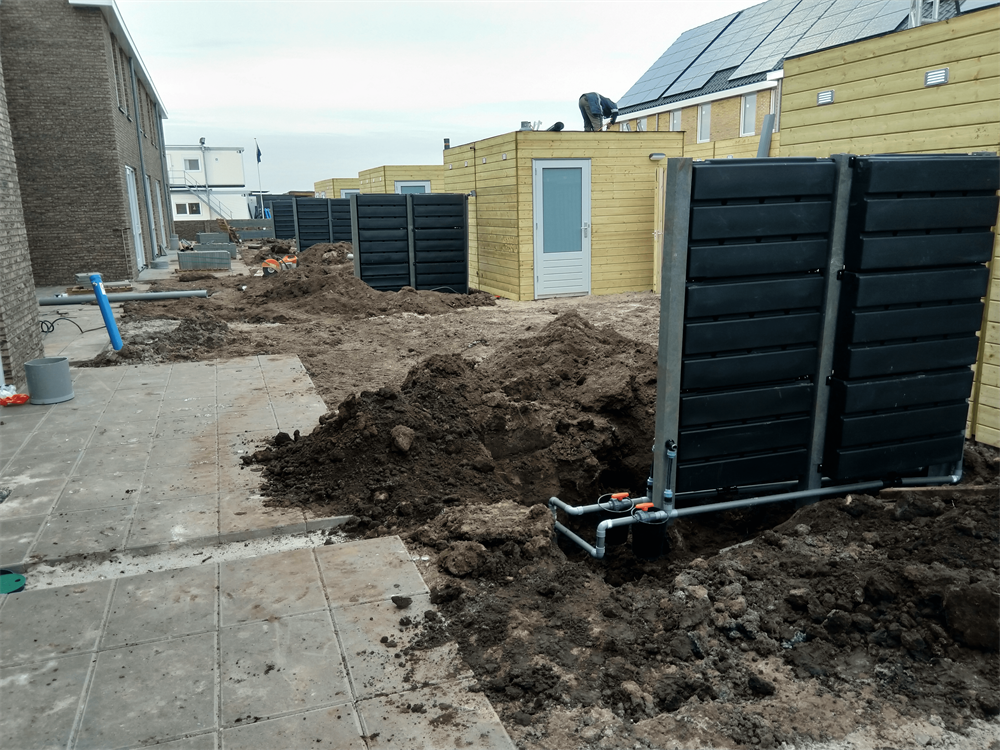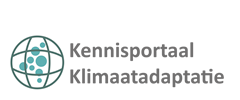Rainwater fence in Zwolle collects rainwater and encourages greening
Having a fence collect rainwater? In the city of Zwolle, the gardens of 40 council rental homes have been provided with rainwater fences. Each fence will collect more than 650 litres of rainwater. In addition to combating waterlogging, the fences also encourage residents to green their gardens and utilise the rainwater stored.
The municipality of Zwolle is developing the new Breecamp neighbourhood. Stichting Openbaar Belang housing corporation is building 40 future-proof social rental homes here. In this case, future-proof pertains to the energy transition and climate adaptation: on the one hand, the homes have been constructed on a natural gas-free and “zero on the meter” basis, while on the other, the housing corporation has explored, in collaboration with the district water board, how the residents can be involved in the prevention of waterlogging, drought, and heat in their area. It has opted for a garden fence that collects rainwater flowing from the roof of the shed.

Image: Construction of “Rainwinners”, modular rainwater fences in Breecamp Noord (Zwolle).
Rainwater fence
The parties involved opted for rainwater fences (“Rainwinners”) to separate the gardens of the rental homes. The fences collect rainwater, thus reducing the risk of waterlogging in the neighbourhood. One advantage of the fences is that they are capable of collecting large volumes of water, whilst occupying only a small space. Moreover, during dry periods, residents can use the water collected to irrigate their gardens. The fences are thus multi-functional: in addition to separating gardens, they provide a solution to waterlogging and drought.
Visible measures to boost commitment
In consultation with the district water board, the housing corporation has opted for visible climate adaptation measures. Many waterlogging measures, such as rainwater sewers or infiltration crates, are implemented underground and are thus invisible to residents. The rainwater fence helps to raise climate adaptation awareness and commitment among local residents.
Encouraging greening
Furthermore, the rainwater fence induces residents to make efficient use of the rainwater stored. This encourages residents to green their gardens. The idea is that using rainwater for greenery will be a subject of conversation during neighbourhood gatherings and birthday parties, thus sparking local interest for the topic. In order to ensure that residents actually opt for greening, Sunny Rain Solutions, the developer of the Rainwater fence, has drawn up the “Green is Good” strategy. This is an action plan for governments focused on converting obstacles to greening into opportunities, and on utilising existing opportunities more efficiently. The strategy is supported by the Ministry of Infrastructure and Water Management, RIONED [interest group for urban drainage issues], and the Foundation for Applied Water Research STOWA. Greening gardens will not just help to further climate-proof the neighbourhood (reducing waterlogging and heat); living in a green environment is also safer, healthier, more pleasant, and more comfortable.
Support from the district water board
The district water board supports sustainable initiatives that contribute to reducing the impact of climate change. Thus, this Rainwinner project has received a grant under the “Climate Active” incentive scheme.
Lessons to be learned from the project
-
(Financial) support for climate adaptation measures and greening. In view of the added value of real estate located in a climate-proof and healthy living environment, increasingly more organisations such as housing corporations, real estate managers, architects, and development agencies are committing to greening and climate adaptation measures in projects. This is improving the quality of neighbourhoods. Municipal authorities and district water boards also benefit from this quality improvement, and many of them are prepared to help pay for such measures. The district water board has funded one-third of the costs involved in the rainwater fences project in Zwolle.
-
Regional collaborative platforms bring parties together. The parties collaborating in this project – the WDO Delta district water board, Sunny Rain Solutions, and the Stichting Openbaar Belang housing corporation – are all associated with the Climate Campus regional collaborative platform. The parties have become acquainted through this platform and have collectively developed an initiative which has added value for each of the parties. The Climate Campus platform is focused on promoting and facilitating (regional) collaboration and innovative solutions in the field of climate adaptation. The platform, which has been operational for more than a year now, is starting to bear fruit: it is proving to be an efficient tool for implementing smart, innovative solutions through projects.
-
Water storage encourages greening. The rainwater collected in the garden fences encourages residents to consider options for putting it to good use. The first thing that will come into mind is introducing more “greenery” in the garden.
Contact person
Harry den Hartigh
SunnyRain Solutions
info@sunnyrainsolutions.nl
